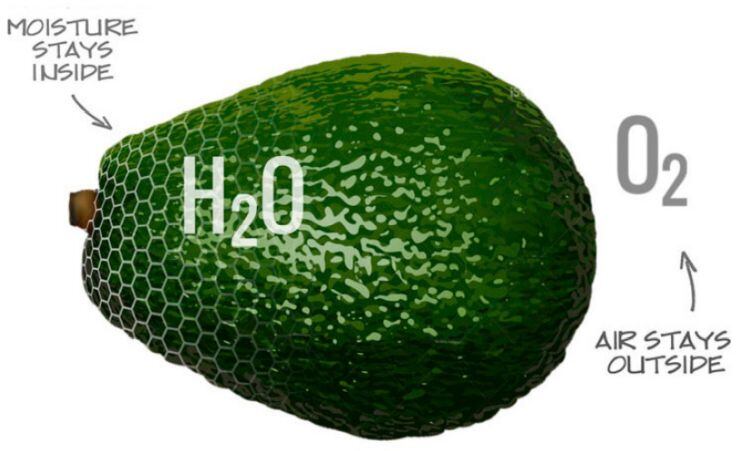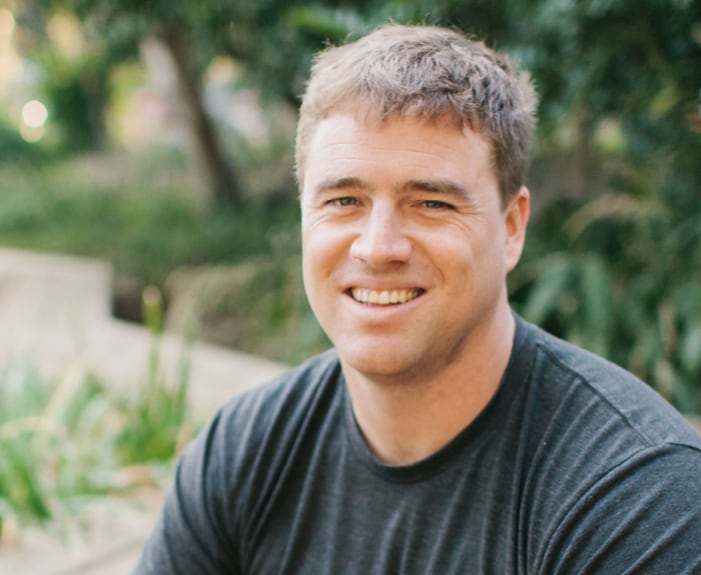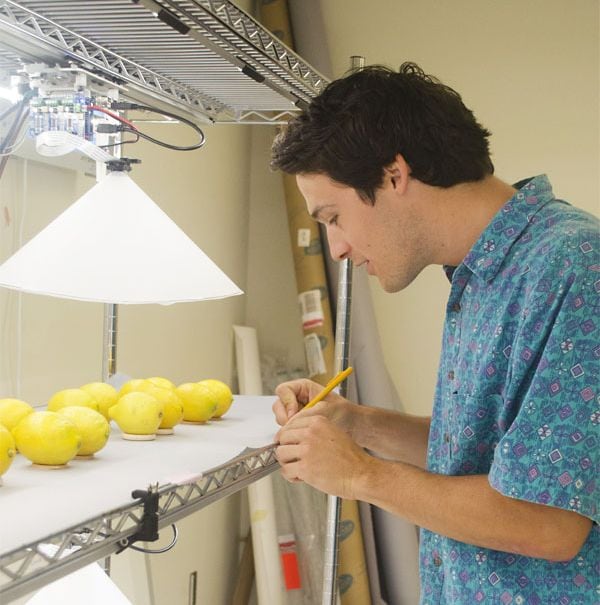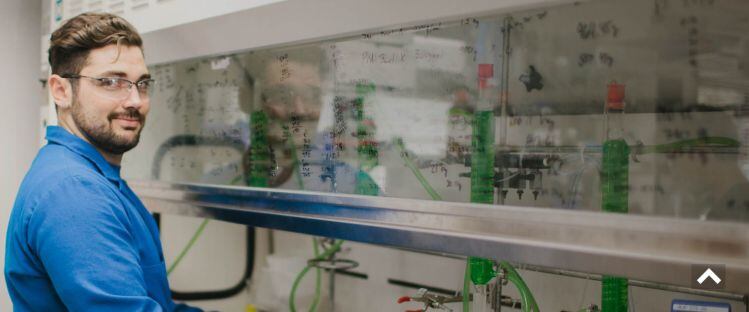“Most people don’t think about this, but produce is a living, breathing thing, even after it’s picked,” says the Apeel Sciences founder and CEO, who is on a mission to slash food waste with Edipeel: an invisible plant-based edible peel proven to dramatically extend the shelf-life of fruits and vegetables.
“By creating a semi-permeable barrier that allows us to modulate the rate that water is evaporating out and the rate that oxygen gets in, we are able to develop this idealized little microclimate inside of each individual piece of produce,” says Rogers, who had his Eureka moment while studying for a PhD at the University of California, Santa Barbara, and “could not talk myself out of why it wouldn’t work.
“I kept thinking, someone must be doing this, it seems so obvious, but I looked into it, and it turns out that although people were using wax [which is far less effective than Edipeel, he says], they hadn’t asked the questions a materials scientist would ask, so I just went ahead and got to work.
“The trick is to maintain as much moisture as possible and maintain a very delicate balance between the rate of oxygen getting in and the rate of carbon dioxide getting out.
“If you cut down the oxygen too much, the fruit won’t develop appropriately and it will develop off flavors, and if you don’t cut down the oxygen enough, you’ll have no impact,” says Rogers, who secured a letter of no objection from the FDA to his GRAS determination for Edipeel last year, and is now producing commercial quantities for citrus and avocados, with multiple other applications to follow spanning everything from strawberries and bananas to mangos, green beans and asparagus.
‘I kept thinking, someone must be doing this…’
He explains: “Using Edipeel [which is supplied as a powder that can be mixed with water and sprayed onto produce, or used as a dip, at packing facilities] means we can dial down the humidity on the refrigerated shipping containers because the fruit is not losing moisture so quickly, and eliminate the use of fungicides.
“And then when the container is opened, because each piece of produce has that little microclimate, you get the benefits even when the fruit is sitting on the retail shelf all the way home to the consumer’s home.”
Right now, he says, the temperature is dialed down and humidity is turned up in refrigerated containers (of which Rogers has two at his facility in Goleta, California, for testing).
“The low temperature slows down the respiration rate of the fruit, and the high humidity reduces the rate that it loses moisture. But the challenge is that if you imagine the perfect mold growth environment, it’s at a relatively low temp and high humidity, so to combat that you typically apply fungicides, which is a sub-optimal solution.”
Perhaps the most effective tool to demonstrate what Edipeel does is what Apeel employees refer to as 'The Time Machine,' whereby Apeel lines up treated and untreated produce side by side, films what happens over a period of days or weeks, and then creates a time-lapse video, so viewers can see exactly how the samples compare at day 3, 6, 10, 20 and so on.
While time-lapse photography/film is not new, Apeel's Time Machine also records and analyzes data about color, texture, size and volume, and feeds this back into its computer systems to inform the development process, so is not just something fun to show potential customers as part of the sales pitch.
Impact: Once you achieve an average of about a 4X extension in shelf life, you can replace the use of the cold chain
In some applications, Edipeel is so effective that not only can you eliminate fungicides, you can also eliminate the cold chain altogether, which could prove transformative for the fresh produce industry, he says.
“The key metric is that once you achieve an average of about a 4X extension in shelf life, you could completely replace the use of the cold chain.”
Ambient storage conditions are typically around 20˚C to 23˚C, he notes, adding that you can store most produce down to almost zero degrees (go below that and ice crystals form which ruin texture of the produce).
“With produce every time you reduce the temp by 10 degrees Celsius you cut the respiration rate in half, so if you go from 23˚C to 13˚C, you cut the respiration rate in half, and if you go from 13˚C to 3˚C, you cut it in half again, so you get a half of a half, or a fourth, and that’s what refrigeration accomplishes," adds Rogers.
"So every time we achieve product performance that reduces respiration rates by a factor of four, we can effectively use that product to replace the cold chain infrastructure.
“The product we’re rolling out now is an average of a 2X extension, but in our labs we have demonstrated an average 3X extension across a dozen categories, and we have a pathway to 4X extension across all categories.”

Invisible, plant-based, GRAS, and approved for use in produce
So what’s in Edipeel?
“By limiting ourselves to materials that are extracted from plants [typically Apeel uses agricultural by-products such as tomato skins and seeds, where the source material is consistent], we select the appropriate combinations such that when we mix them up in water and they dry, they self-assemble into structures [an edible ‘skin’ of consistent thickness] that allow us to independently modulate the rate of oxygen and carbon dioxide transmission to create this optimized microclimate,” says Rogers, who says the composition is “predominantly lipid-based.”
This does not, however, make it waxy or greasy. Indeed, the primary attraction to retailers is that Edipeel is both ‘all-natural’ and invisible: it’s colorless, odorless, tasteless and undetectable on produce (no sticky or waxy residue), says Rogers. “You can’t see it, smell it, taste it, or feel it. And it’s just plants. We use food to preserve food.”

Apeel Sciences founder and CEO Dr. James Rogers received dual undergraduate degrees from Carnegie Mellon University in materials science and engineering and biomedical engineering. For his Ph.D. research, he was the recipient of the 2012 Frank J. Padden Jr. Award for polymer physics, the premier polymer physics prize in the United States.
Supported by a National Science Foundation graduate research fellowship, Rogers earned his Ph.D. in materials science from the University of California, Santa Barbara. He also holds a Masters degree in economics, and is a graduate of UCSB's technology management program.
You can’t see it, smell it, taste it, or feel it
To produce Edipeel at scale, as Apeel has started to do at its facility in Santa Barbara, requires heat, pressure and mechanical agitation to accelerate the composting process for its plant-based raw materials. Apeel then pressure cooks the material and extracts the desired components.
As for the number of iterations, there are as many types of Edipeel as there are different types of produce (one size does not fit all).
But given the team’s growing knowledge and expertise of the respiration rates of different fruits and vegetables, the 'guessing' involved at the start of every new product development process becomes more and more educated, says Rogers, who notes that in future, Apeel may be able to utilize synthetic biology techniques to manufacture its wares instead of extracting them from agricultural by products.

As the conditions in Apeel’s labs clearly differ from the conditions fresh fruit from Chile might be subjected to as it travels to US supermarkets, for example, the company has also developed sophisticated monitoring techniques to track the conditions (temperature, humidity etc) in which produce is being transported, in real time, and then mirror those conditions in its facility so that it can develop solutions that it knows will work in the field.
People in this industry have been doing things the same way for decades
So how has the fresh produce industry reacted to Apeel Sciences, and to Rogers himself?
Surprisingly, perhaps, given what an apparent no brainer Rogers has developed, the produce industry did not initially welcome him with open arms, with some players viewing anyone in a white lab coat proposing to meddle with their produce – and systems they have been using for decades – with suspicion, he recalls.
“People in this industry have been doing things the same way for decades and having letters after your name [PhD] actually worked against me; at the start there were a few people where it was a case of who are you to tell me how to run my business?
“So having to educate the market as to what this is and how it works took a very long time,” in part, he says, because there is a “disconnect” - and in many cases, thousands of miles - between what’s happening at the grower level, and what’s happening in retail outlets where produce is sold.
“It goes back to the chain of custody, but there’s a disconnect between the parties responsible for growing and transporting the produce and the parties responsible for merchandising and selling it, which has led to a slowdown in the rate of pick up for new technologies in this industry.”

Quality benefits as well as reduced cost and waste
That said, the time lapse imagery is so compelling, that retailers, growers and other stakeholders across the produce supply chain in the US and overseas are now sitting up and taking notice, says Rogers, who has assembled a team of 80+ microbiologists, materials scientists, process engineers, chemists, biologists, toxicologists, synthetic biology experts and other scientists at Apeel's facility in Goleta.
While the industry is understandably excited about the potential to cut costs and reduce waste, there are also potential quality benefits if growers stop harvesting unripe fruit (which they often do with tomatoes and some other fruits in a bid to extend shelf-life) and allow it to develop full nutrition and flavor before it’s picked, he says.
“Optimizing harvest decisions for growers is one of the things I am most excited about.”
*Apeel Sciences has raised $40m to-date from partners including Andreessen Horowitz, DBL Partners, BMGF, Upfront Ventures, S2G, and Powerplant Ventures.
